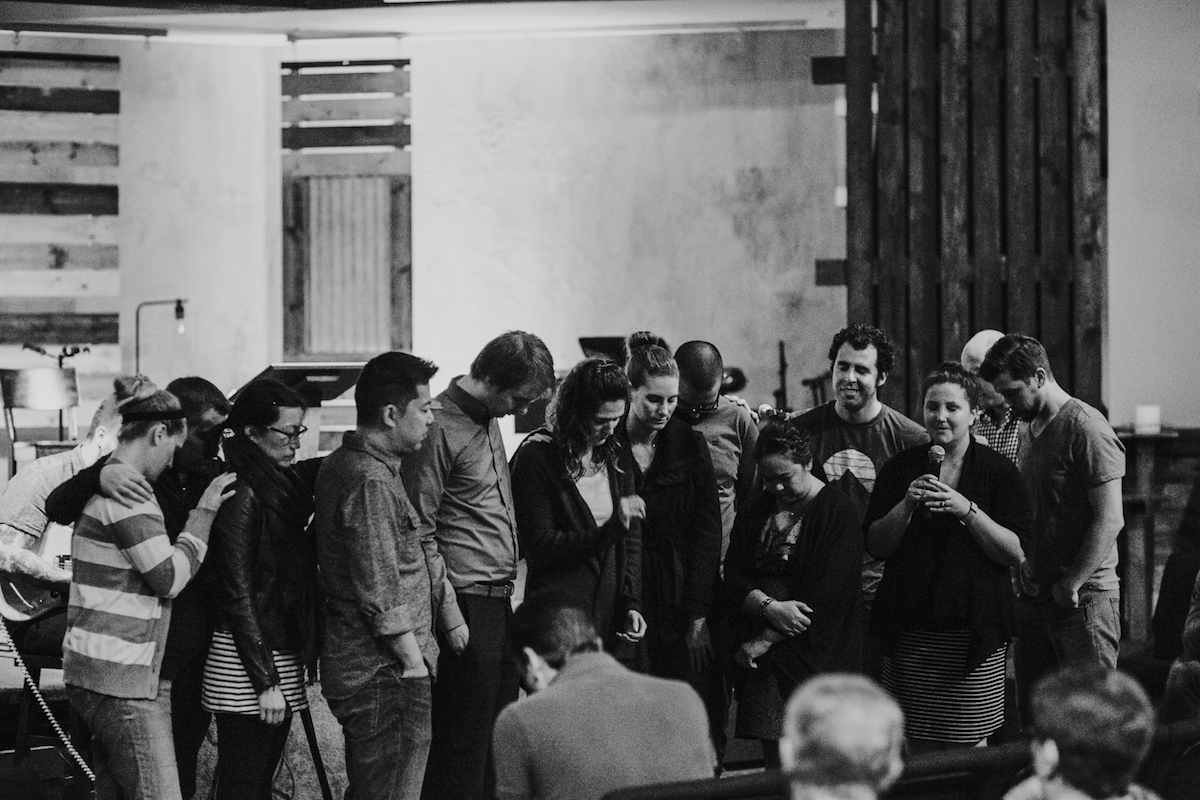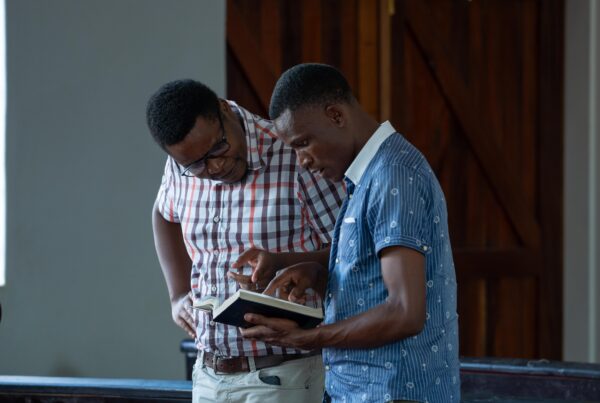WE CAN DO MORE TOGETHER. This axiom is self-evident for most people. It’s echoed in the familiar motto, ‘United we stand, divided we fall.’ It’s probably fair to say that it’s simply common sense. This is why we strive to collaborate at every level of life and society, whether in business or education; politics or civics; or even with family and friends. This notion is instilled within us even from our early childhood days in learning how to work together on a team, to playing organized sports. We simply know that our joint efforts amount to greater success. It’s just that simple – we can do more together. So why not embrace this mindset for the church’s mission?
Most churches and leaders agree we can do more together, the struggle is embracing it
Let’s be fair – most churches and church leaders would agree as well that we can do more together. So that is not the real rub. The struggle is found in the area of embrace. Embracing the idea requires a little more then simply aspirations of collaboration. You see embracing something goes beyond mere recognition or ‘tipping one’s hat’. Embrace is a willing enthusiastic acceptance of something. It requires ‘open arms’ and ‘settled hearts’. It is a welcome reception that bears significance in the affairs of life. When we embrace the understanding that we can do more together, then we will begin to have exponential impact for the work of the Gospel in the world.
So why is it such a struggle to work together? The reasons are most certainly manifold and complex, however I want to highlight three barriers that hinder moving us to accomplishing more together.
First, there is a theological barrier.
Ecclesiocentrism is the term given to denote the centrality of the local church for God’s work of redemption in the world. This doesn’t mean that God is not at work in other spaces and places in the world. Yet it does rightly discern that the prescription and pattern in the Scriptures is that God has chosen to accomplish his redemptive work primarily in and through the local church. Local churches are central to God’s mission. However, it appears that ‘ecclesiocentrism’ has been morphed into much ‘ecclesio-self-centrism’ in our day. Please excuse the bad pun – but for many churches, the focus of their work doesn’t extend beyond their local church. The primacy of the local church in God’s mission is meant to be a means to serve the larger work of God’s kingdom expansion, not simply an end in itself. Ecclesiocentrism is to be kingdom-focused. Local churches as outposts for the kingdom are united with every legitimate local church across the world. This provides the proper perspective for understanding the work that God is doing in local churches. Therefore every local church has a kingdom-responsibility. Local churches are not simply to build their little kingdoms, but work towards building God’s kingdom throughout the world. This means every church has an obligation, not simply an option, to work together to see God’s work accomplished.
Local churches are not to build their little kingdoms, but work towards building God’s kingdom throughout the world.
Second, there is a cultural barrier.
Second, there is a cultural barrier. Social commentators ad infinitum have identified the self as the dominant cultural force that shapes the face of western society. The self-interests of individuals, groups, and communities determine the culture’s ways of life and important causes. It is assumed that all people should be free to determine their own destinies and set their own agenda. This should create an obvious tension when this dominant cultural value manifests itself in the church. The church proclaims the good news that ‘Jesus is Lord’, not anyone else. By definition, God’s agenda takes center stage and all other agendas must be set aside. Unfortunately too many churches allow the self-interests of their congregations to set the agenda. This produces churches with bloated ministry options to appease the preferential desires of their people or affinity-based church communities that fail to reflect the diversity of God’s kingdom. Isolation and insulation becomes the by-product. These churches have to isolate themselves from other churches, being worried that their parishioners may be drawn away by better options at other churches. This in turn results in insulation from the shaping effects of being involved in God’s larger diverse kingdom. The church’s orientation tragically shifts to itself, adopting the dominant cultural value that the ‘Self is Lord’. Working with other churches to do more together becomes virtually impossible.
Third, there is a personal barrier.
The Psalmist says, ‘Let the peoples praise you, O God; let all the peoples praise you!’ (Ps.67:5) Ask almost any sane pastor on a test, who deserves all the praise and glory in the church and you will undoubtedly hear, ‘God!’ Yet many pastors and church leaders are unable to serve and work together with other pastors and churches unless they get recognition. With the rise of social media and the celebrity pastor culture, more and more pastors are more concerned with Facebook likes, Tweet shares, and Instagram hearts, then doing the behind the scenes work necessary to further God’s mission. God’s work gets bottlenecked by our attempts to build our personal ministry platforms. But here’s the reality. The majority of God’s church throughout history has been built by unknowns. These are pastors and leaders that are willing to set aside the need for recognition of their personal ministries and simply do what is needed to serve the furtherance of the gospel. This shifts the question from, ‘What’s in it for me?’ to ‘How can I help?’
As these barriers are overcome within the churches and church leadership, we will be freed to do more together. The results will be exponential, not simply additive.
I’m always amazed when I hear old stories of how early settlers and pioneers would build their entire homes from scratch. They would have to clear the land by hand. Find ingenious ways to move the timber after it had been cut. Dig the foundation themselves. Utilize primitive tools to strip and carve the wood. Notch and set the lumber. Attach the roofing and this was just the beginning. They’d typically go on to cultivate a garden and dig a well and on and on. All of this they would accomplish by themselves and it was certainly an amazing feat. Much of this today sounds very rustic and even possibly romantic to some. However you don’t see many people today attempting to build their homes in this fashion anymore and rightly so. Since those days society has been through the Industrial Revolution and many technological advances in which we have learned to diversify our gifts and talents to complement each other for the advancement of society. The societal advances have been exponential.
Much in the same way, churches must realize that they do not have to go at the work alone. Each individual church is part of the larger church body that is comprised of a wide range of gifts and talents. These diverse gifts and talents are for the building of the body and the advancement of the kingdom. As we begin to embrace this understanding of God’s kingdom, it should lead our churches to work together and we will accomplish more together. We will plant more churches. We will raise up more leaders. We will see more believers. We will have more diversity. We will experience more understanding. We will have a stronger witness. We will see less failure. We will avoid more pitfalls. We will have more to celebrate. We will grow healthier. We will expand faster. We will have a lasting legacy of churches for generations. And we will see God rightfully receive all the glory he is due. We can and must do more together.
Let me suggest 3 simple questions that can help you reflect on doing more together through your church:
- Are you connected?
It goes without saying, but I’m going to say it, ‘You can’t do anything together by yourself.’ In order to begin to do more together you must be connected to other churches and pastors who are planting churches and will spur you on to partner to plant churches. Being part of Acts 29 for many years now has afforded our church more opportunities to be involved in church planting then we can count. It has enabled us to support and experience the work of God through church planting locally in our area, but also across the globe. We connected early in our church plant with other planters and pastors who provided much needed wisdom and through the network we were able to contribute to church planting from the beginning. These connections have only strengthened throughout the years and continue to be vital in our church’s efforts to see the gospel go forth.
- Are you giving?
Jesus tells us that ‘Where your treasure is, there your heart will be also’ (Matthew 6:21). This is true for the treasures your church has been entrusted with. I hear too many, and I mean too many, stories of churches that believe they are about the work of church planting and yet only pennies or sometimes not a dime goes beyond the walls of their church’s ministries. Allocating your church’s mission budget to take a group of your pastors or church planting residents to a church planting conference is a misguided attempt to support church planting at best or at worst it’s simply disingenuous. If we are truly going to accomplish all that God intends for us, then we must give generously to church planting without selfish strings attached. Is your church monetarily supporting other church plants? When our treasure goes to God’s mission in church planting, then our hearts reflect God’s heart.
- Are you long-sighted?
The heavy attrition rate for churches and church plants in supporting church planting can certainly be linked to a short-sighted ministry philosophy. In order to experience real lasting success in church planting then we must be long-sighted. God is not impatient about his mission. We must not be hasty. I’ve often heard the concept of ‘planting pregnant’, which naively sounds good to us. However, it would be a medical anomaly of the most shocking kind to find out that your newborn daughter was pregnant. Women become pregnant after their bodies mature so that they can reproduce healthy babies. Churches that mature well reproduce well. This means that churches need to establish a healthy membership and eldership, which then in turn can train and deploy church planters well with the resources and support they need for success. We must stay a little while before we go. This requires long-sightedness. What are your 5, 10, 20, and 50-year visions? What does it look like for your church, as it develops, to collaborate for the work of church planting?
WE CAN DO MORE TOGETHER. WE MUST DO MORE TOGETHER.
Bryan Laughlin (@bryanlaughlin) is the lead pastor of Remnant Church in Richmond, VA, where he lives with his wife and four children. He is an experienced pastor and planter with a heart for the Gospel and church planting. He has served many years in the local church, training and equipping leaders for Gospel ministry.










